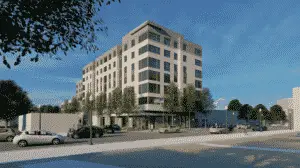White house initiative for office-to-housing conversions Faces Hurdles! In a bid to transform underutilized office spaces into much-needed housing near transit, the Biden administration’s $35 billion financing program is facing criticism from developers. Lengthy delays, bureaucratic red tape, and stringent criteria are hindering the effectiveness of the initiative, with several projects stuck in the underwriting phase.
Gulf Tower Project Struggles Despite Ideal Location
Pittsburgh’s iconic Gulf Tower, once the headquarters of Gulf Oil Company, is now at the center of the struggle. Despite being an ideal candidate for the program, Rugby Realty, the owner, finds the White House initiative unworkable due to extended approval timelines of 18 to 24 months, a stark contrast to the typical 60 to 90 days in real estate financing deals.
Developers are grappling with challenges such as onerous environmental reviews, strict credit criteria tailored for rail projects, and a requirement that projects be within a half-mile of a train station. These issues have deterred many property owners, leaving the intended funds inaccessible for those eager to address vacancy concerns in downtown areas.
Developers Call for Program Improvement
While acknowledging the administration’s intent, developers emphasize the need for program enhancement. Aaron Stauber, Principal and President of Rugby, urges the President to focus on improving the program to make it more viable for developers seeking to convert office spaces into residential and hotel projects.
LEFT LANE Tackles Gulf Tower Conversion
To navigate the challenges, Rugby tapped into LEFT LANE, a New York-based developer specializing in historic rehab projects. LEFT LANE is working on converting Gulf Tower into a mixed-use residential and hotel project, but the hurdles imposed by the financing program are causing delays and uncertainties.
Challenges Extend Beyond Pittsburgh
Developers across the U.S., including LEFT LANE, are facing challenges with the program’s definition of “transit-oriented.” Projects near local transit systems, like light rails and bus rapid transit lines, are often excluded, limiting the scope of eligible developments. Cities like Memphis, Phoenix, and Columbus are finding themselves excluded from the benefits due to the program’s restrictive criteria.
Cincinnati’s Plea for Program Adjustments
Cincinnati, represented by the Mercantile Library Building conversion, is also grappling with program limitations. Developers are urging adjustments to the program, seeking more flexibility in defining “transit-oriented” developments to include projects like the city’s streetcar loop.
Congressional Involvement and Future Outlook
As the frustration among developers grows, calls for Congressional intervention are intensifying. Representative Greg Landsman from downtown Cincinnati is engaging with USDOT to explore ways to make the program more accessible for Southwest Ohio.
The urgency to address the issue is emphasized, as vacant office spaces continue to pose a threat to the economic vitality of cities. Developers warn that delays in resolving the problem may lead to a more challenging situation in the future, with potential economic repercussions as office vacancies persist.
Related posts:
 Affordable Rental Provider Repays $710K to Arlington County
Affordable Rental Provider Repays $710K to Arlington County
 Reduce Your Environmental Footprint: Simple Water Conservation Tips for Your Home
Reduce Your Environmental Footprint: Simple Water Conservation Tips for Your Home
 10 Precautions to Stay Safe During a Home Renovation
10 Precautions to Stay Safe During a Home Renovation
 Surge in US Housing: A Close Look at the November 2023 Boom
Surge in US Housing: A Close Look at the November 2023 Boom
 Seattle Fort Lawton Housing Plan Revision: A New Vision for Affordable Living
Seattle Fort Lawton Housing Plan Revision: A New Vision for Affordable Living




